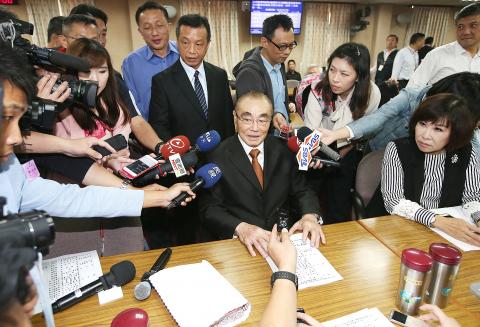A legal expert yesterday demanded that the judiciary fully investigate alleged influence peddling, financial improprieties and profiteering by former president Ma Ying-jeou (馬英九) in connection with the Taipei Dome project and a Ministry of National Defense initiative to domestically produce warships.
Farglory Group (遠雄集團) was originally required to pay a performance bond of NT$3.042 billion (US$100.8 million at the current exchange rate) to build the Taipei Dome.
Then-Taipei Department of Finance commissioner Lee Sush-der (李述德), who was on Tuesday sentenced to 10 years in jail by the Taipei District Court, was in charge of negotiating the contract with Farglory.

Photo: CNA
However, “after Ma held several secret meetings with Farglory founder Chao Teng-hsiung (趙藤雄), it was decided that the performance bond was to be waived,” attorney Lin Fu-kuei (林富貴) said. “The decision was not made in an open meeting, nor were experts and other officials consulted.”
“While Lee shouldered most of the responsibility, prosecutors suspect that Ma used his influence to benefit Farglory. Therefore, Ma could be seen as a co-conspirator and could be indicted for illegally benefiting a third party in his capacity as a public functionary, in which case he would face a minimum prison term of five years,” Lin said.
Lee headed the department when Ma was Taipei mayor and had a key role in the Taipei Dome contract negotiations from 2004 to 2006, when he allegedly acted on behalf of Ma to grant favorable financial terms to Farglory and allow for the relaxation of safety regulations.
Separately, following a report alleging that Ma helped scandal-hit Ching Fu Shipbuilding Co (慶富造船) secure a syndicated loan from state-run banks for a navy project, the Cabinet yesterday said that it would turn over anyone suspected of breaking the law to the judiciary.
Ching Fu, which was awarded a NT$35.8 billion contract to build six minesweepers for the navy as part of a domestic warship program, defaulted on the NT$20.5 billion syndicated loan, First Commercial Bank (第一銀行), the lead lender of the loan, said on Wednesday last week.
The Chinese-language Mirror Media weekly reported that a Cabinet task force on Tuesday met to investigate the loan and discovered that the Presidential Office on Sept. 1, 2015 — when Ma was president — issued a classified document to the Executive Yuan that included a letter by Ching Fu president Chen Ching-nan (陳慶男) petitioning Ma to assist the company in securing the loan.
The document asked relevant government agencies, including the Ministry of National Defense, the Financial Supervisory Commission and the Ministry of Economic Affairs, to offer suggestions on the matter, the report said.
In October 2015, state-run banks appeared unwilling to approve the loan, but they eventually did so in February last year, the report said.
The report quoted an unnamed government official as saying that the banks would not have reversed their position without political intervention.
“The investigation is comprehensive. It is not exclusive. Anyone found to have been involved in illegal acts during the tender process will be transferred to the judiciary. Those found negligent during a review of the loan request will be removed,” Executive Yuan spokesman Hsu Kuo-yung (徐國勇) said.
Ma office spokeswoman Hsu Chiao-hsin (徐巧芯) rejected the allegations, saying that the Presidential Office under Ma followed standard procedure by passing the petition to relevant agencies.
“The [Presidential Office’s handling of the letter] is the result of interference by top management without any evidence,” Hsu Chiao-hsin said, suggesting that the document was deliberately leaked to the media to divert attention to Ma and to protect those actually responsible.

Taiwanese can file complaints with the Tourism Administration to report travel agencies if their activities caused termination of a person’s citizenship, Mainland Affairs Council Minister Chiu Chui-cheng (邱垂正) said yesterday, after a podcaster highlighted a case in which a person’s citizenship was canceled for receiving a single-use Chinese passport to enter Russia. The council is aware of incidents in which people who signed up through Chinese travel agencies for tours of Russia were told they could obtain Russian visas and fast-track border clearance, Chiu told reporters on the sidelines of an event in Taipei. However, the travel agencies actually applied

Japanese footwear brand Onitsuka Tiger today issued a public apology and said it has suspended an employee amid allegations that the staff member discriminated against a Vietnamese customer at its Taipei 101 store. Posting on the social media platform Threads yesterday, a user said that an employee at the store said that “those shoes are very expensive” when her friend, who is a migrant worker from Vietnam, asked for assistance. The employee then ignored her until she asked again, to which she replied: "We don't have a size 37." The post had amassed nearly 26,000 likes and 916 comments as of this

US President Donald Trump said "it’s up to" Chinese President Xi Jinping (習近平) what China does on Taiwan, but that he would be "very unhappy" with a change in the "status quo," the New York Times said in an interview published yesterday. Xi "considers it to be a part of China, and that’s up to him what he’s going to be doing," Trump told the newspaper on Wednesday. "But I’ve expressed to him that I would be very unhappy if he did that, and I don’t think he’ll do that," he added. "I hope he doesn’t do that." Trump made the comments in

New measures aimed at making Taiwan more attractive to foreign professionals came into effect this month, the National Development Council said yesterday. Among the changes, international students at Taiwanese universities would be able to work in Taiwan without a work permit in the two years after they graduate, explainer materials provided by the council said. In addition, foreign nationals who graduated from one of the world’s top 200 universities within the past five years can also apply for a two-year open work permit. Previously, those graduates would have needed to apply for a work permit using point-based criteria or have a Taiwanese company